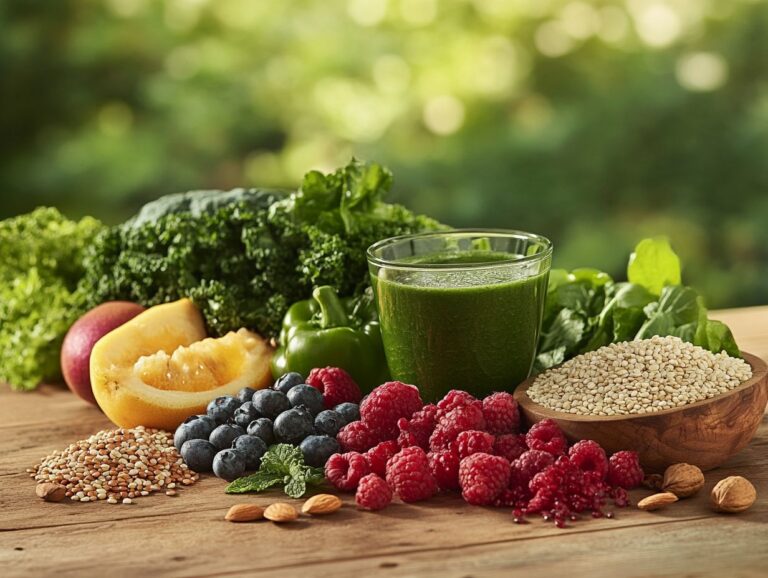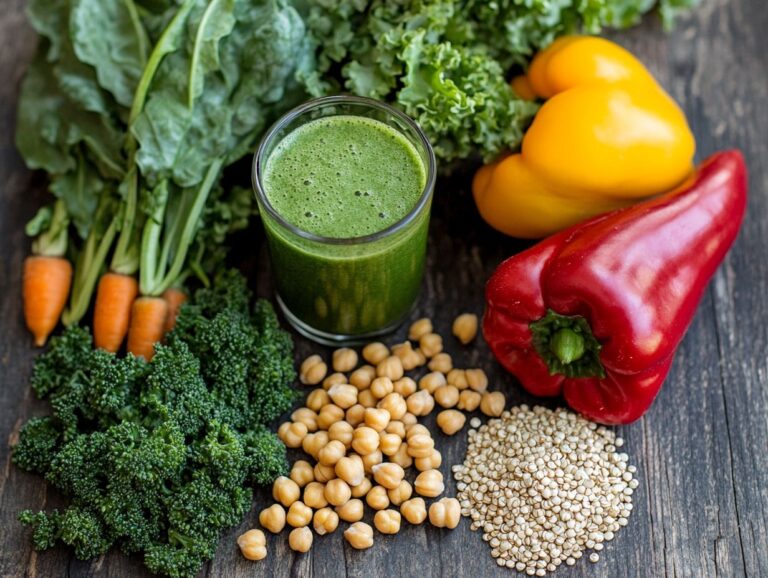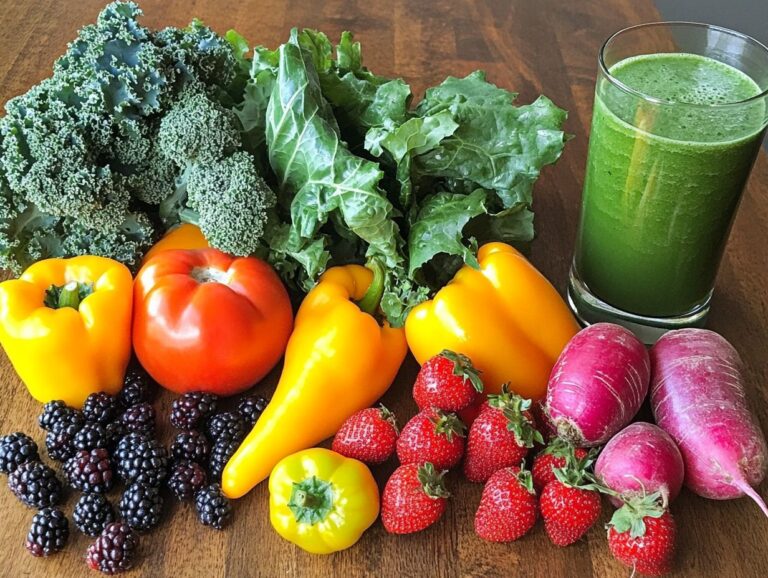Polycystic Ovary Syndrome (PCOS) affects many individuals, resulting in various hormonal imbalances and health challenges. This common hormonal issue among women, especially during their childbearing age, highlights the need for effective management strategies. For those seeking natural solutions, a vegan diet may offer promising benefits by promoting a balanced diet and heart health. This article explores how adopting a plant-based nutrition approach can help manage PCOS symptoms, emphasizing essential nutrients that promote hormonal balance, improve gut health, and the positive effects of a vegan lifestyle. Additionally, it addresses potential risks associated with this diet, such as nutrient deficiencies and protein intake, and provides practical tips for successfully incorporating vegan foods into your meals. Discover how you can empower your health journey through informed choices.
What Is PCOS?
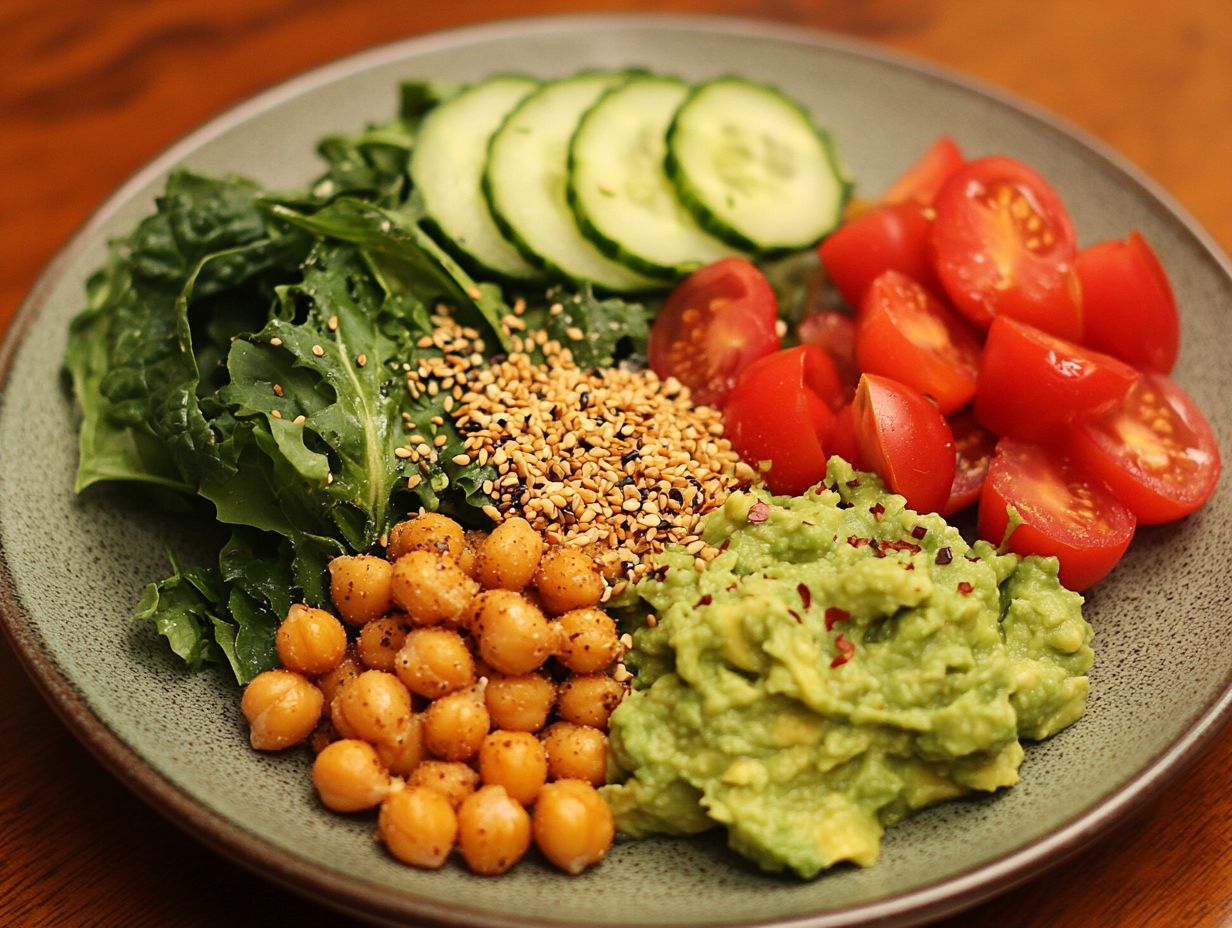
Polycystic Ovary Syndrome (PCOS) is a prevalent hormonal disorder affecting women, particularly during their childbearing age.
It is characterized by a range of symptoms, including irregular periods, hair loss, and unintentional weight gain. This condition can impact a woman’s health and well-being in various ways, highlighting the importance of early diagnosis and treatment to improve health outcomes.
How Can the Vegan Diet Help with PCOS?
A vegan diet can be effective in managing Polycystic Ovary Syndrome (PCOS) by promoting a balanced intake of whole foods, encouraging positive lifestyle changes, and aiding in carbohydrate management that can help alleviate the symptoms of the condition.
What Nutrients Are Important for Hormonal Balance?
Several key nutrients are essential for hormonal balance in women with Polycystic Ovary Syndrome (PCOS), including omega-3 fatty acids, vitamin D, calcium, and magnesium. Addressing vitamin D deficiency and maintaining proper calcium levels are particularly crucial. These nutrients play important roles in regulating hormone levels, improving insulin sensitivity, reducing insulin resistance, and supporting overall health.
They can be easily incorporated into a vegan diet in a variety of delicious and nourishing ways. Omega-3 fatty acids, which are vital for combating inflammation and enhancing insulin sensitivity, are found in chia seeds, flaxseeds, and walnuts. Vitamin D, necessary for hormonal regulation, can be obtained from fortified plant milks and through exposure to sunlight. Calcium, which is important for bone health and may help regulate menstrual cycles, is available in leafy greens and fortified tofu. Lastly, magnesium, which supports metabolic processes, can be found in legumes, nuts, lentils, and whole grains.
How Can a Vegan Diet Provide These Nutrients?
A well-planned vegan diet can effectively meet the nutritional needs of women with Polycystic Ovary Syndrome (PCOS) while ensuring an adequate intake of omega-3 fatty acids, vitamin D, calcium, and magnesium. This can be achieved through a variety of plant-based protein sources, including legumes, beans, tofu, tempeh, and fortified foods, which are essential for improving overall health and well-being.
Incorporating a diverse range of fruits, vegetables, whole grains, and nuts can further enhance nutrient access and ensure a healthy fibre intake.
Effective meal planning can include nutrient-dense options such as:
- Quinoa bowls with black beans and avocado
- Stir-fries with tofu and colorful vegetables
- Smoothies made with spinach, chia seeds, and almond milk
It is important to expose the diet to a wide variety of foods to prevent deficiencies and maintain a well-balanced hormonal environment. Consulting a registered dietitian can help tailor a vegan meal plan to meet individual needs. Additionally, regularly including fermented foods like sauerkraut or kimchi can positively influence gut health, which is closely linked to hormonal balance. This makes the vegan diet not only nutritious but also enriching for individuals with PCOS.
What Are the Benefits of a Vegan Diet for PCOS?

The benefits of a vegan diet for women with Polycystic Ovary Syndrome (PCOS) include reductions in inflammation, improved insulin sensitivity, support for weight management, and contributions to balanced hormone levels.
These factors collectively enhance the quality of life for those affected by PCOS.
1. Reduces Inflammation
One of the key benefits of a vegan diet is its ability to reduce inflammation, which is particularly important for women with Polycystic Ovary Syndrome (PCOS), as chronic inflammation can exacerbate their symptoms.
The focus on whole food sources, such as fruits, vegetables, and legumes, provides antioxidants and anti-inflammatory compounds that contribute to overall health.
For instance, foods rich in omega-3 fatty acids, such as chia seeds, flaxseeds, and walnuts, can significantly lower inflammation levels in the body and may also reduce the risk of heart disease. These plant-based omega-3 sources are also known to positively influence lipid profiles and may assist in regulating the menstrual cycles of women with PCOS.
Additionally, brightly colored fruits and vegetables, such as berries, spinach, and kale, are packed with antioxidants that combat oxidative stress, further enhancing health outcomes.
By incorporating a diverse array of these anti-inflammatory foods into their daily diet, individuals can improve their overall health, reduce inflammation, and potentially lessen the severity of PCOS symptoms.
2. Improves Insulin Sensitivity
Insulin sensitivity is a crucial factor for women with Polycystic Ovary Syndrome (PCOS), and adopting a vegan diet can enhance insulin sensitivity through effective carbohydrate control and the inclusion of low glycemic foods, such as whole grains.
This approach helps regulate blood sugar levels, maintain hormonal balance, and improve glycemic control. A diet rich in fiber from legumes, fruits, and vegetables can further improve insulin sensitivity, as these foods are not only nutritious but also filling, which aids in portion control.
Opting for meals that include a healthy balance of fats and proteins while limiting carbohydrate intake can help maintain steady energy levels throughout the day. By following these principles, individuals on a plant-based diet can reap the health benefits of a vegan lifestyle while effectively managing their food choices and improving insulin sensitivity.
3. Promotes Weight Loss
A vegan diet can effectively promote weight loss and weight management for women with Polycystic Ovary Syndrome (PCOS) by encouraging the consumption of low-calorie, nutrient-dense foods. This approach fosters a healthy relationship with food and improves body image, facilitating sustainable and healthy weight management.
Vegan diets typically emphasize whole foods such as fruits, vegetables, whole grains, and legumes. As a result, calorie intake is often naturally reduced while nutrient intake increases, aiding in effective weight management. This focus on whole foods supports portion control and establishes a foundation for adopting mindful eating practices.
Mindful eating involves slowing down during meals and being attuned to the body’s hunger signals, both of which are crucial for women experiencing the challenges of PCOS. These practices are essential for regulating insulin levels and reducing weight gain, representing the first step toward a lifestyle where healthy choices become automatic.
By combining all these components, women can develop a successful plan for managing weight, improving body image, and promoting overall well-being.
4. Balances Hormones
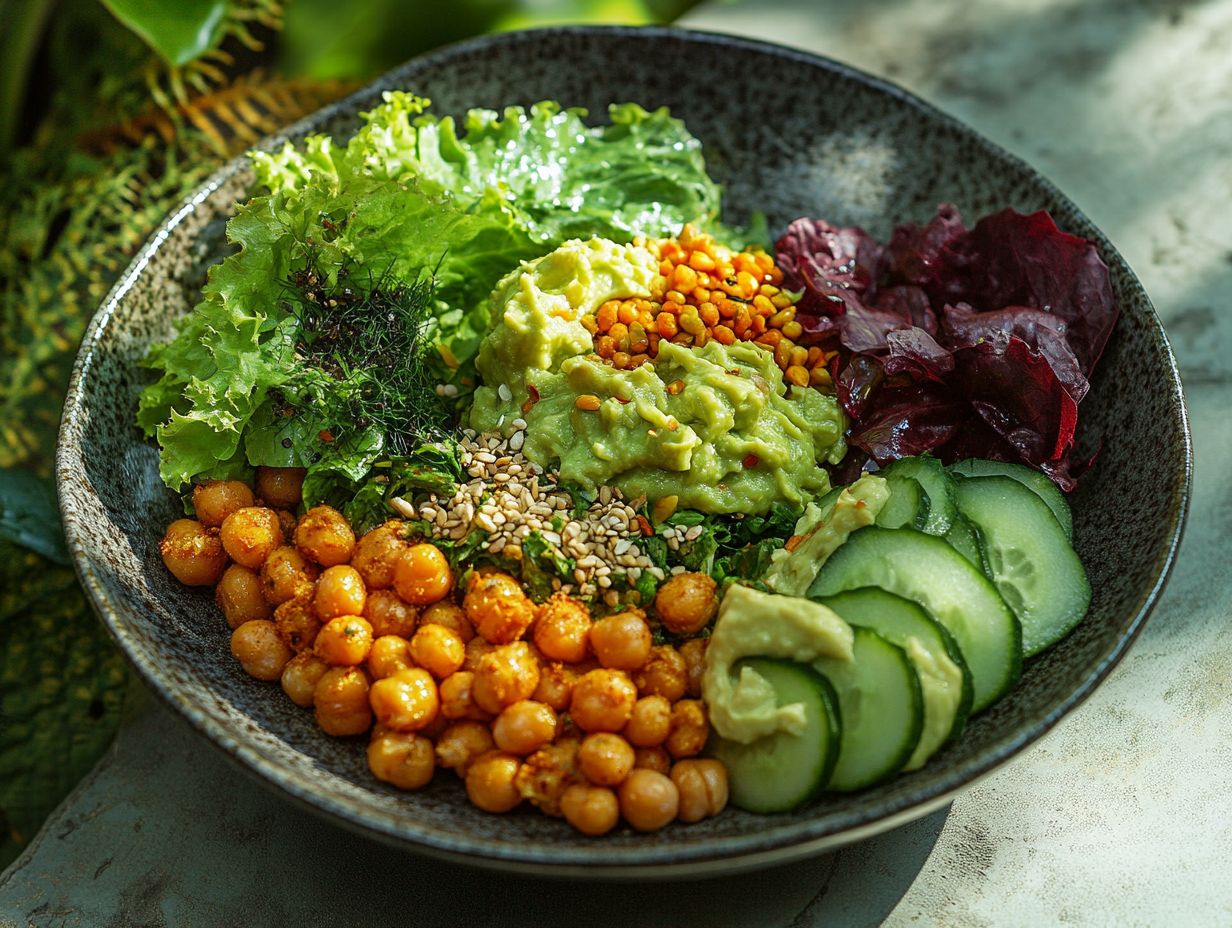
The importance of balanced hormones in treating Polycystic Ovary Syndrome (PCOS) underscores the need for a structured vegan diet that emphasizes nutrient-rich meals promoting overall hormonal balance and emotional well-being.
A diverse array of plant foods can provide the essential nutrients required for hormonal stability. It is crucial to consume a wide variety of colorful fruits, vegetables, whole grains, legumes, and nuts to ensure an adequate intake of vitamins and minerals, which are often lacking in processed diets.
For instance, fiber from these foods can help regulate blood sugar levels, a key factor in reducing insulin resistance, which is frequently problematic for individuals with PCOS. This also supports carbohydrate management and heart health. A well-rounded assortment of nutrients not only contributes to physical stability but also enhances mental clarity and emotional resilience, give the power toing women to feel more in control of their well-being.
Additionally, a vegan approach fosters a greater connection with food and encourages mindful eating, which can alleviate stress and improve emotional health.
What Are the Risks of a Vegan Diet for PCOS?
While a vegan diet can offer significant benefits for managing Polycystic Ovary Syndrome (PCOS), it also carries potential risks, such as nutrient deficiencies, the possibility of disordered eating, challenges in meeting protein requirements, and maintaining adequate vitamin B12 and iron levels.
Understanding these risks enables individuals to make informed dietary choices.
1. Nutrient Deficiencies
The primary risks associated with a vegan diet for women with Polycystic Ovary Syndrome (PCOS) include nutrient deficiencies, particularly in vitamin B12, iron, calcium, and other essential nutrients necessary for optimal health. To combat these potential shortages, conscious awareness and careful planning are essential.
These deficiencies can lead to anemia, weakened bones, and fatigue, which may exacerbate PCOS symptoms. Supplements such as vitamin B12, iron, and calcium can be crucial in managing these deficiencies. Vegan individuals should aim to incorporate fortified foods, such as plant-based milks and cereals, to help supply the nutrients that are more challenging to obtain. Additionally, supplements can play a crucial role in ensuring adequate intake of vitamin B12, iron, and other essential nutrients.
Regular consultations with a medical professional or a registered dietitian are important for monitoring nutrient levels. This approach allows for timely adjustments to diet or supplements, contributing to the overall well-being of the individual while also aiding in the management of PCOS.
2. Potential for Disordered Eating
Women with Polycystic Ovary Syndrome (PCOS) who adopt a vegan diet may face a heightened risk of disordered eating, particularly if their focus on food selection leads to unhealthy behaviors related to body image and emotional well-being.
Adequate nourishment is essential for mental health, and research indicates that the risk of disordered eating increases among individuals who adhere to strict diets. This is particularly concerning for women with Polycystic Ovary Syndrome (PCOS), who might also experience conditions like insulin resistance and vitamin D deficiency.
For those with PCOS, following a rigid vegan diet can amplify anxiety and foster obsessive thoughts about eating and weight. This heightened awareness may result in decreased self-esteem and a negative body image. In Canada, women with PCOS are increasingly seeking strategies to manage these challenges.
To mitigate these psychological risks, individuals are encouraged to practice mindful eating techniques that shift the emphasis from perfectionism to the enjoyment of food’s sensory qualities, which can be enhanced by incorporating a diverse plant-based diet rich in whole grains and legumes.
Additionally, seeking support from trained professionals, such as registered dietitians or therapists specializing in eating disorders, can facilitate this process and help foster a healthier relationship with food, ultimately enhancing emotional well-being. A discovery call with such professionals can outline a personalized approach to managing PCOS symptoms.
3. Difficulty Meeting Protein Needs

Women with Polycystic Ovary Syndrome (PCOS) may struggle to meet their protein requirements on a vegan diet if they are unaware of various sources of plant-based proteins, such as legumes, tofu, tempeh, and beans like lentils and chickpeas.
Effective meal planning can help achieve adequate protein intake while following a vegan diet. Sufficient protein intake is crucial for managing PCOS symptoms, as protein plays a vital role in hormone regulation and promoting satiety.
Plant-based diets can offer women with PCOS a variety of protein options, including:
- Quinoa
- Seitan
- Chia seeds
- Nuts
By incorporating these foods into their daily meals, women can ensure they meet their protein needs while also improving their overall health and wellness. Adequate intake of essential nutrients such as magnesium and iron is also important in this context.
Batch cooking legumes and preparing high-protein snacks can be effective meal prep strategies that make it easier and more enjoyable for women to stick to their dietary goals.
How to Incorporate a Vegan Diet for PCOS?
The effective management of Polycystic Ovary Syndrome (PCOS) in women can be accomplished through a vegan diet that incorporates whole foods, mindful meal planning, and appropriate supplementation.
This approach involves creating a balanced and health-promoting lifestyle that emphasizes nutritious plant-based ingredients, addressing potential deficiencies such as omega-3 fatty acids, vitamin D, and vitamin B12 through diet and supplementation.
1. Focus on Whole Foods
Women on a vegan diet can best manage Polycystic Ovary Syndrome (PCOS) by focusing on whole foods, as these nutrient-dense meals help reduce inflammation and promote overall health.
Whole foods provide essential vitamins, minerals, and fiber that contribute to well-being and the maintenance of hormonal balance. A variety of fruits and vegetables, including leafy greens like spinach, berries, and cruciferous vegetables, offer antioxidants that combat oxidative stress, which is commonly associated with PCOS.
Additionally, whole grains such as quinoa and brown rice serve as sources of complex carbohydrates, promoting stable blood sugar levels. Legumes, including lentils and chickpeas, are rich in protein and fiber, which enhance satiety and support hormonal regulation.
Incorporating these nutrient-rich options can significantly improve health while managing the symptoms of PCOS.
2. Include Plant-Based Sources of Protein
For women with Polycystic Ovary Syndrome (PCOS) following a vegan diet, consuming a variety of plant-based protein sources is crucial to ensure adequate protein intake that supports overall health and hormonal balance.
Foods such as legumes, tofu, tempeh, and nuts provide essential amino acids necessary for well-being. These protein-rich options not only help regulate blood sugar levels, which is vital for managing PCOS symptoms, but they also promote satiety, aiding in weight control.
To incorporate these ingredients into meals, consider adding:
- lentils to salads or soups,
- including tofu in stir-fries,
- using nut butters in smoothies.
Additionally, quinoa or edamame can enhance the protein content of grain bowls.
3. Consider Supplements for Nutrient Needs
Supplements play a crucial role in the treatment of women with Polycystic Ovary Syndrome (PCOS) who follow a vegan diet, as they are necessary to meet macro and micronutrient requirements for vitamin D, vitamin B12, calcium, and iron. Supplementation can help address nutrient deficiencies and enhance overall health.
In a vegan lifestyle, where animal products are excluded, certain nutrients may not be consumed in sufficient amounts, potentially leading to adverse health outcomes. For instance, vitamin B12, essential for nerve function and red blood cell production, is primarily found in animal sources and is often recommended as a universal supplement for those on a plant-based diet. Additionally, vegan diets can be lower in omega-3 fatty acids, making algal oil supplements advisable. Furthermore, metformin, commonly used in managing PCOS, might increase the need for vitamin B12 supplementation.
Individuals should assess their dietary intake and have their nutrient levels tested before starting any supplementation. The quality of supplements can be evaluated through third-party testing, transparency regarding sourcing, and formulations that meet specific health needs.
Well-researched, high-quality supplements can significantly contribute to a balanced diet and overall well-being.
